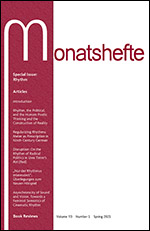|


|

Subscribe
Read the Journal Online
Submission Guidelines
Editorial Board
Receive Email Updates
Advertise in Monatshefte
Indexes/Abstracts
Current Issue TOC
Back Issues TOC
Monatshefte 2022 Subscription Rates
Institutions:
print & online $271
online only $233
Individuals:
print & online $103
online only $86
Non U.S. Postage (no postage charges for online-only subscriptions)
Airmail: add $40/yr.
Canadian Subscribers: add 5% GST. |
Monatshefte
Volume 90, Number 3, Fall 1998 Table of Contents
Brecht Special Issue
Jost Hermand and Marc Silberman
Introduction: Brecht Today
Articles
Robert Cohen
Brecht in Goldbach
Abstract:
Could there still be, in this year of celebrating Brecht’s hundredth anniversary, a single individual who ever knew or met Brecht and who has not yet come forward? The author of this contribution, born in 1941 in Switzerland, claims to be that individual. From faded memories, distant voices, and disjointed fragments of poetry, he tries to reconstruct this (for him) historic moment, fifty years ago. A puppet theater, built by the author’s parents from an old playpen, becomes the stage for a once-in-a-lifetime performance by Brecht and Fritz Kortner, a performance whose only trace remains in the author’s head. It might seem that the author’s need to identify with the object of his research got the better of him, were it not for the appearance, in the spring of 1998, of volume 30 of the new Brecht edition, which contains Brecht’s letters. . . . (RC) (In German)
Karla L. Schultz
Utopias From Hell: Brecht’s Mahagonny and Adorno’s Treasure of Indian Joe
Abstract:
The critique of a culture thriving on the magic of substitution and the myth of equity was developed by Brecht and Adorno in the late 1920s. Both criticized what each considered a deadly combination, idealism and capitalism. The entanglement is with us still, consisting of the magic formula that says, “This is so because I call it so,” and the mythical law that decrees, “Everything has its price.” This article takes a current human interest story as the starting point to trace the approach. Brecht’s The Rise and Fall of the City of Mahagonny (1929), as well as Adorno’s libretto “after Mark Twain,” The Treasure of Indian Joe (1932), are utopias with a twist: they self-destruct to expose their conditions, performing a vivisection on the idealist heart and the capitalist brain, i.e., the social imaginary and the social law. In both cases, the negative dialectics employed deconstruct a cultural alliance which rests on inequity and a fettered imagination. (KLS)
Thomas Eickhoff
Keuner and Karajan im ‘Kalten Krieg’—Die Versuch des Komponisten Gottfried von Einem, Bertolt Brecht für die Salzburger Festspiele zu gewinnen
Abstract:
Gottfried von Einem (1918–96), Austrian composer and member of the Board of Directors of the Salzburg Festival, maintained contact with Bertolt Brecht beginning in 1948. With Brecht’s help, he wanted to undertake a renewal of the festival, to be inspired by a repertoire of contemporary music and theater. For his work as a “festival-dramatist,” Brecht was to be rewarded with Austrian citizenship. In spite of the anti-Communist mood of the Cold War era, Brecht received an Austrian passport after Einem had helped him overcome numerous political bureaucratic impediments. However, as an alleged Communist sympathizer, the composer became the target of demagogic intrigues. Before his opponents—who mostly grouped themselves around Herbert von Karajan—could oust him, Einem resigned from the Board of Directors. Furthermore, aesthetic differences prevented a close cooperation of the composer and the writer. As a result, Einem’s encounter with Brecht did not leave a lasting impression on his work as a composer. (TE) (In German)
Ernst Schumacher
“Die Verurteilung der Roten Armee nach Bertolt Brecht”
Abstract:
This article presents a little-known anonymous parody on the opera “Die Verurteilung des Lukullus” by Bertolt Brecht and Paul Dessau. Entitled “Die Verurteilung der Roten Armee nach Bertolt Brecht,” it was published in the fall of 1952 by the anticommunist Aktion-Verlag in Frankfurt am Main. Imitating the opera in content and structure, the author of the parody transforms the Roman hero into the real marshal of the Soviet Union, Wassili Iwanowitsch Tschuikow, defender of Moscow and Stalingrad, commander of the Eighth Army in the 1945 Battle of Berlin, High Commissioner of the Soviet Union in Germany from 1949 to 1953. The Red Army is accused of war crimes and the Soviet system is branded as inhuman; the marshal is sentenced and the approaching decline of the Soviet Union is prophesied with quotations from Brecht’s The Measure and The Mother. (ES) (In German)
Helmut Peitsch
‘In den Zeiten der Schwäche . . .’: Zu Spuren Brechts in der europäischen Debatte über engagierte Literatur
Abstract:
The important role Brecht played in the European debate on committed literature in the 1960s has been overlooked, despite the fact that Adorno’s polemical article of 1962 criticized Brecht more harshly than Sartre. Brecht’s notion of ‘sich engagieren,’ which brings together politics and aesthetics under the terms of criticism and change, can be traced back to the early 1930s, when Benjamin imported the French debate into German criticism. When Barthes and Eco took up Brecht’s concepts in the 1950s and 1960s, they ascribed a meaning to “commitment” which, to a certain degree, anticipated postmodern tendencies. (HP) (In German)
Book Reviews
|

